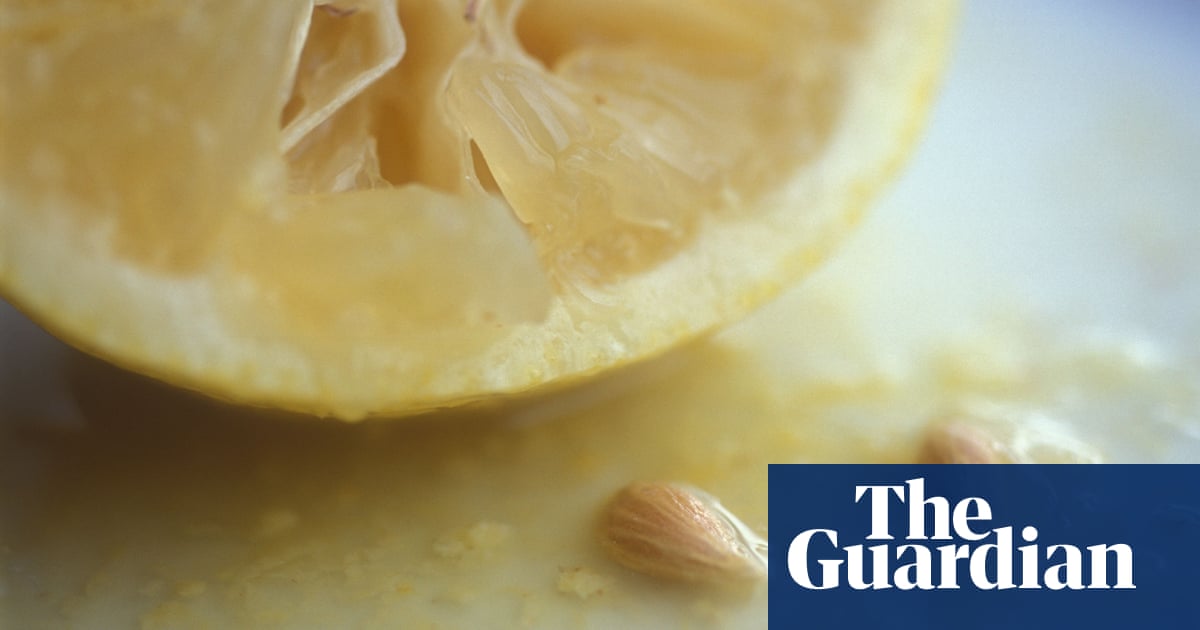Are there more pips in lemons than there used to be? That’s definitely my impression. What’s going on?Andrea Wilson, Manchester
Send new questions tonq@theguardian.com.
I knew this would finally pay off. These are my diary records:
1975: 8.2 mppl (mean pips per lemon); 1976: 7.9; 1977: 8.3; 1978: 7.9; 1979: 8.0; 1980: 8.2; 1981: 8.1; 1982: 7.8; 1983: 7.8; 1984: 11.2; 1985: 8.6; 1986: 8.3; 1987: 8.1; 1988: 8.2; 1989: 7.9; 1990: 7.9; 1991: 8.0; 1992: 8.0; 1993: 8.0; 1994: 7.8; 1995: 7.7; 1996: 7.9; 1997: 8.4; 1998: 8.0; 1999: 7.8; 2000: 8.1; 2001: 8.0; 2002: 8.0; 2003: 7.5; 2004: 7.7; 2005: 8.1; 2006: 7.8; 2007: 7.9; 2008: 8.4; 2009: 6.9; 2010: 7.6; 2011: 7.8; 2012: 8.1; 2013: 8.2; 2014: 8.3; 2015: 8.3; 2016: 8.3; 2017: 8.5; 2018: 8.3; 2019: 7.8; 2020: 7.7; 2021: 8.2; 2022: 8.7; 2023: 8.0; 2024: 117.4.
So in summary, yes.theteedeehoo
I don’t know if there are more, but they aren’t squeaking like the should.seedysolipsist
I blame Gladys Knight.PeteTheBeat
I only use limes, not many pips; far better flavour.Psmitharises
A few more years of climate change and you’ll be able to buy Geordie lemons.FrogmellaMousetrap
Ceci n’est pas une pip.EddieChorepost
Yes, your observation is indeed accurate, and I’m pleased to say that now that sufficient time has passed and the reason is no longer subject to the Official Secrets Act, I can finally reveal why.
Before the advent of mobile phones, pips were in constant demand for installation in telephone boxes. So in secret government establishments cunningly concealed behind the scenes inside casinos (where any mention of pips would be unlikely to arouse suspicion and, of course, lemons featured unremarked on all fruit machines) thousands of pips were extracted from lemons immediately after import by a small army of skilled workers, using X-rays, jewellers’ loupes, fine needles and pipettes.
A few pips were allowed to remain in each lemon to allay any suspicions, before the fruit, deprived of most of its seeds and waxed to conceal the tiny holes through which the seeds were extracted, was passed to greengrocers for sale to the unsuspecting public.
Now that phone boxes are no longer functional, being mostly used as libraries, greenhouses or toilets, the familiar pips are surplus to requirements, so that clandestine specialist workforce has long been disbanded, and modern -day lemons are left in peace to retain their full natural complement.
I hope this clarifies the matter?ThereisnoOwl
No, there are precisely six on the hour, every hour. The number has stayed the same for over a century.Dorkalicious
Don’t worry, government policy on disability benefits is designed to bring about a reduction in pips.J63320
They are now producing watermelons with hardly any pips, so I think this is the universe readjusting itself.blitzen13
I recently bought five different types of hand lemon squeezer, so the way you can pip-free juice a lemon has increased, too. I found the small metal funnel you can insert into a whole lemon the best. Costs just a couple of pounds …snazpizaz2
Have you ever noticed how lemon pips cling to the sink in spite of your best efforts to wash them down the drain? There must be some commercial/industrial use of that adhesive-when-wet quality.Oikaze
For drinks, I never worry about the pips. If I swallow one, it doesn’t worry me in the slightest and I’ve hardly ever had a lemon tree grow inside me.AlanAudio
Not only more pips, but they’re better at hiding close to the core. So when you’ve picked out every single bleeder, three more will emerge from the slice you dip into your Earl Grey.Rodber
Lemons have reverted to being more like the lemons of the 1970s, which had quite a lot of pips. We have had a long period of increasingly pip-depleted lemons between, say the late 1990s up to Covid.
I wonder if the recent upswing in pips is due to lemons being sourced elsewhere because of the cost of living crisis.Justdreaming
Mr M and I both had a Pink Lady apple this lunchtime. In both apples we found sprouting pips, they are now residing in compost in the hope of they may continue growing.Morvandelle
